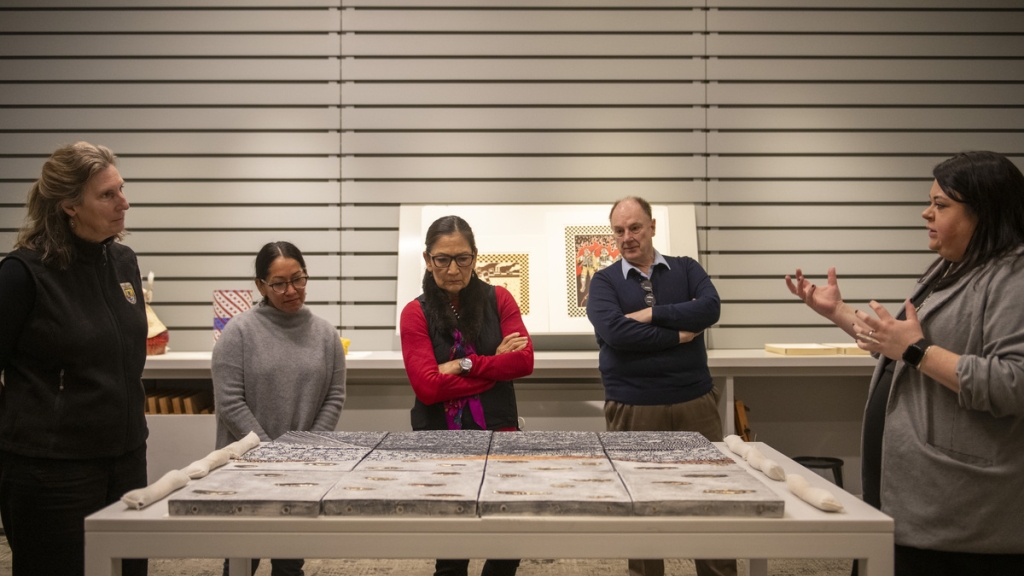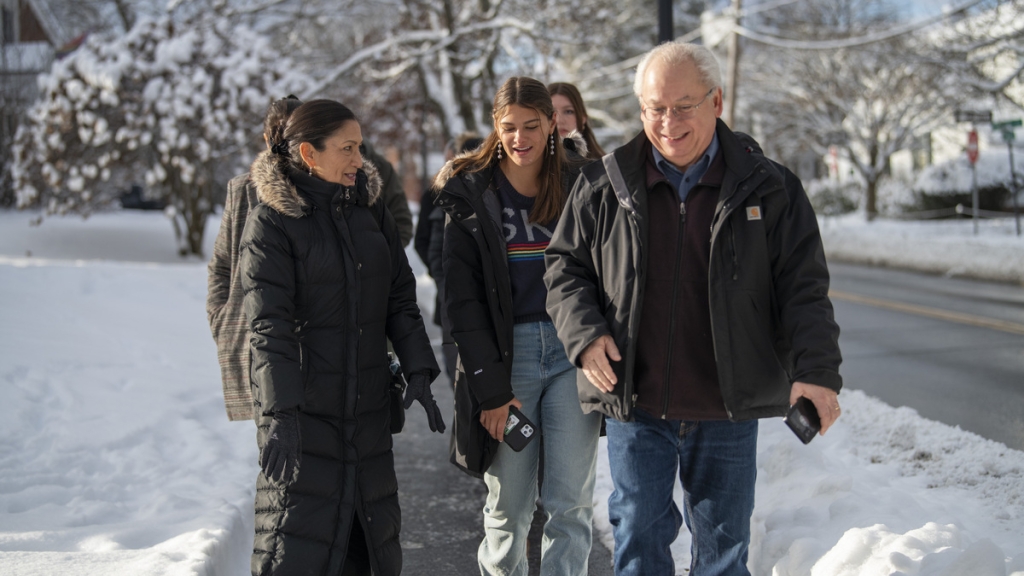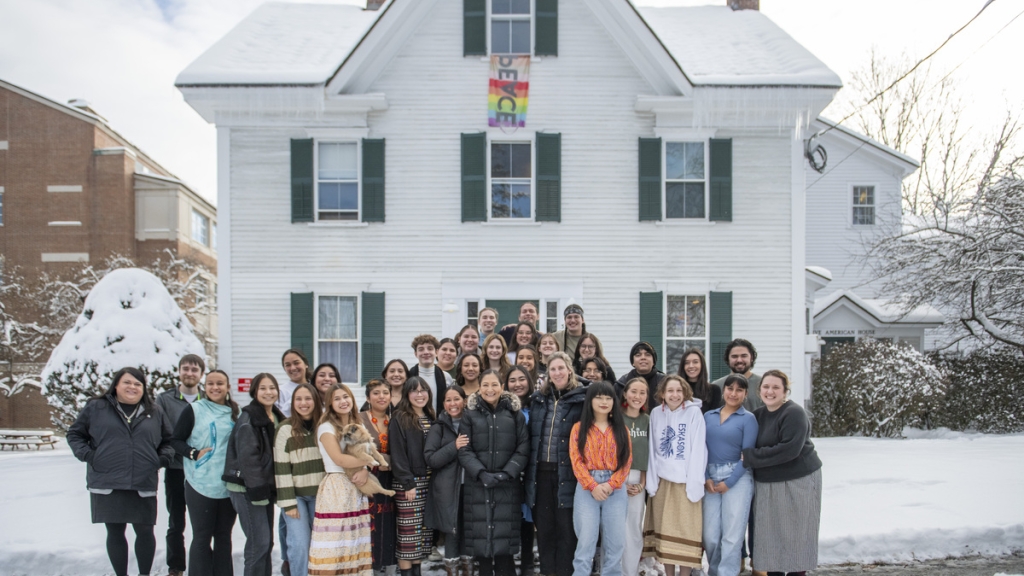Secretary of the Interior Deb Haaland, the first Native American to serve as a cabinet secretary, met with faculty, students, and staff during a visit this week to discuss Dartmouth's academic program in Native and Indigenous studies and related initiatives.
Haaland, a member of the Pueblo of Laguna in New Mexico, traveled to Hanover with a group that included Department of the Interior Senior Counselor Lynn Trujillo '94 and Martha Williams, director of the U.S. Fish and Wildlife Service, all of whom would later head to the New Hampshire coast to highlight federal support for habitat restoration efforts.
Her visit included a meeting on Sunday with President Sian Leah Beilock, faculty, and staff, and a campus tour Monday morning.
Haaland, President Beilock, and faculty and staff from the Department of Native American and Indigenous Studies and the Native American Program discussed Native American and Indigenous studies, support for recruiting and retaining Native and Indigenous students, and new programs reflecting the institution's founding commitment to Native American and Indigenous students.
"I was very appreciative of the chance to meet with Secretary Haaland and discuss several of the important initiatives we are undertaking at Dartmouth," Beilock said.
The tour Monday started at the Hood Museum of Art, where Jami Powell, associate director of curatorial affairs and curator of Indigenous art, gave a talk about a display of work by Native American and Indigenous artists.

Hood Museum of Art Curator of Indigenous Art Jami Powell, right, discusses a piece of art with, from left, U.S. Fish & Wildlife Service Director Martha Williams, Department of Interior Senior Counselor Lynn Trujillo '94, Secretary of the Interior Deb Haaland, and Hood Museum director John Stomberg. (Photo By Kata Sasvari)
The next stop was in front of Dartmouth Hall, where Bruce Duthu '80, the Samson Occom Professor and chair of Native American and Indigenous Studies, pointed out a plaque honoring the crucial role of Samson Occom, a member of the Mohegan tribe, in raising the equivalent of more than $2 million to help launch Dartmouth in 1769.
The 18th-century scholar and Presbyterian minister was working under the promise that Dartmouth would be a school to educate Native students, but after completing the fundraising, Occom learned that the school's founder, the Rev. Eleazar Wheelock, had switched his focus to educating the sons of Colonial settlers and "given up on the Indian condition," Duthu said. "So, we're slowly regaining the perspective as well as honoring the legacy."
In the early 1970s, then-President John Kemeny rededicated Dartmouth to its original mission. Now, more than 200 Native and Indigenous students are currently enrolled at Dartmouth and more than 1,300 have since graduated. The Class of 2027 includes more than 60 self-identified Native and Indigenous students, tied for the largest cohort in Dartmouth history.
Duthu also noted that in 2022, Dartmouth repatriated Occom's papers to the Mohegan Tribe, which he called "a wonderful step" in the reconciliation process.
At Baker Library, Dean of Libraries Sue Mehrer led a tour of The Epic of American Civilization, the series of murals by noted Mexican muralist José Clemente Orozco, which was followed by a stop at the Department of Native and Indigenous Studies.
The visit wrapped up with breakfast at the Native American House, where Haaland addressed more than 30 Native and Indigenous students, some wearing traditional clothing.

Secretary of the Interior Deb Haaland, left, walks through campus Monday morning with Aleaokalani Kahele '27 and Native American and Indigenous Studies Chair Bruce Duthu '80. (Photo By Kata Sasvari)
Haaland said she was proud of the students for taking time to value their education, thanked them for the sacrifice they were making by studying so far away from home, and encouraged them to aim high.
"There's a place for you in our government, in our corporations, in our nonprofit organizations at the most senior level, because we need your voice, and your perspective is incredibly important to the future of this country," she said.
Haaland also stressed the importance of Indigenous knowledge.
Everything they have learned from their families, the ceremonies they have participated in, and the steps they have taken to carry on their culture and traditions, "all have value to our country," she said. "Future generations will benefit from the knowledge that you have currently."
After the short talk, Haaland made her way from table to table, greeting students individually and answering their questions.
Jolynn Tripi '26, a Tlingit student from Portland, Ore., said she wouldn't have missed the chance to meet Haaland.
"I wrote part of my college essay about how you don't see role models like this growing up," said Tripi, who is studying neuroscience with a minor in Native American and Indigenous studies. "Now that I'm older and can see her in this position under Joe Biden and having such an important role for the Native community, it just gives me so much hope for my little cousins."
Noah Martinez '27, of Redding, Calif., called Haaland's visit "a really good reminder" of how important representation is.
"Seeing where she is and how successful she's been, it's really inspiring to be able to see someone like us at that level," he said.
